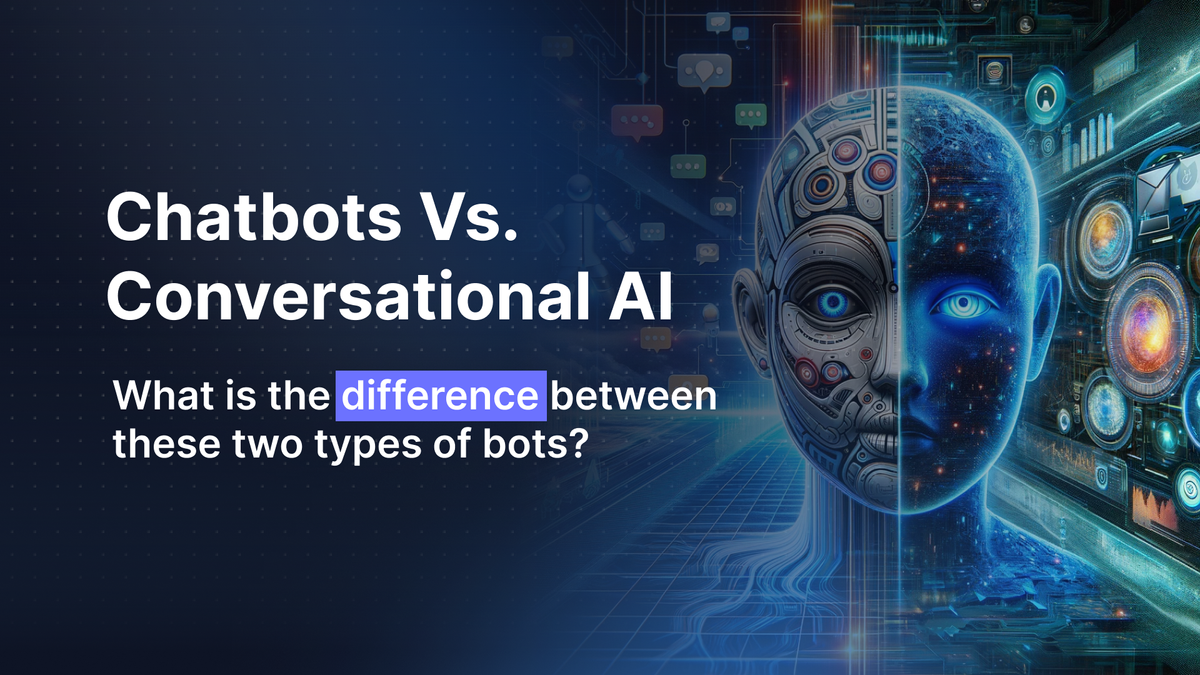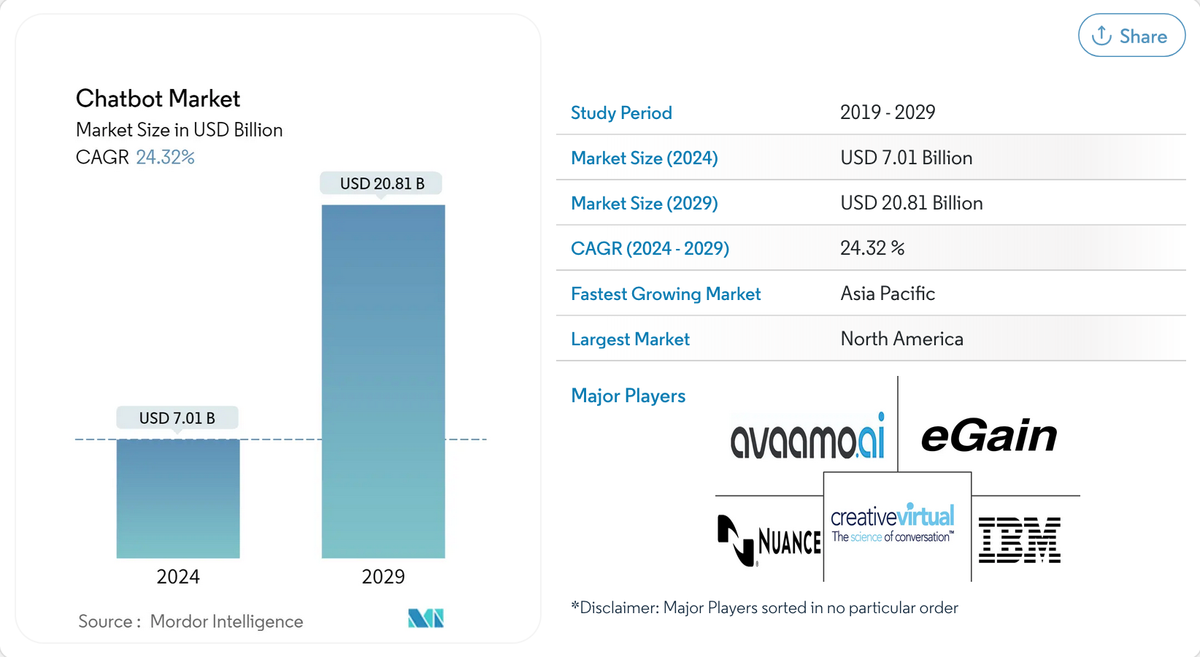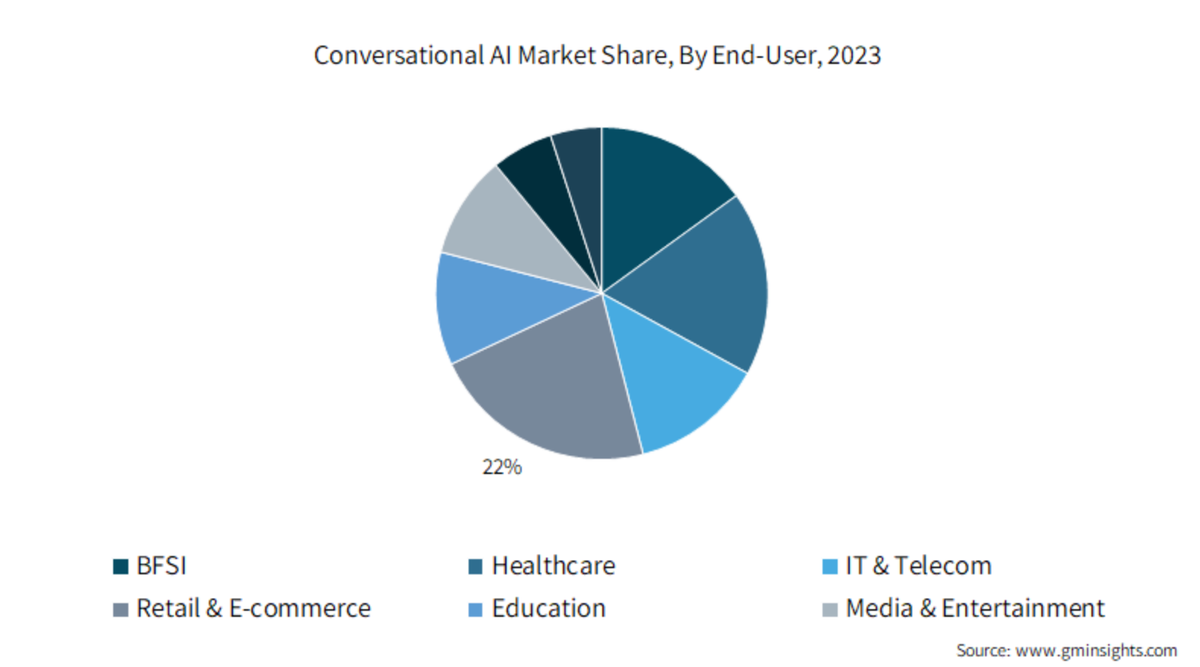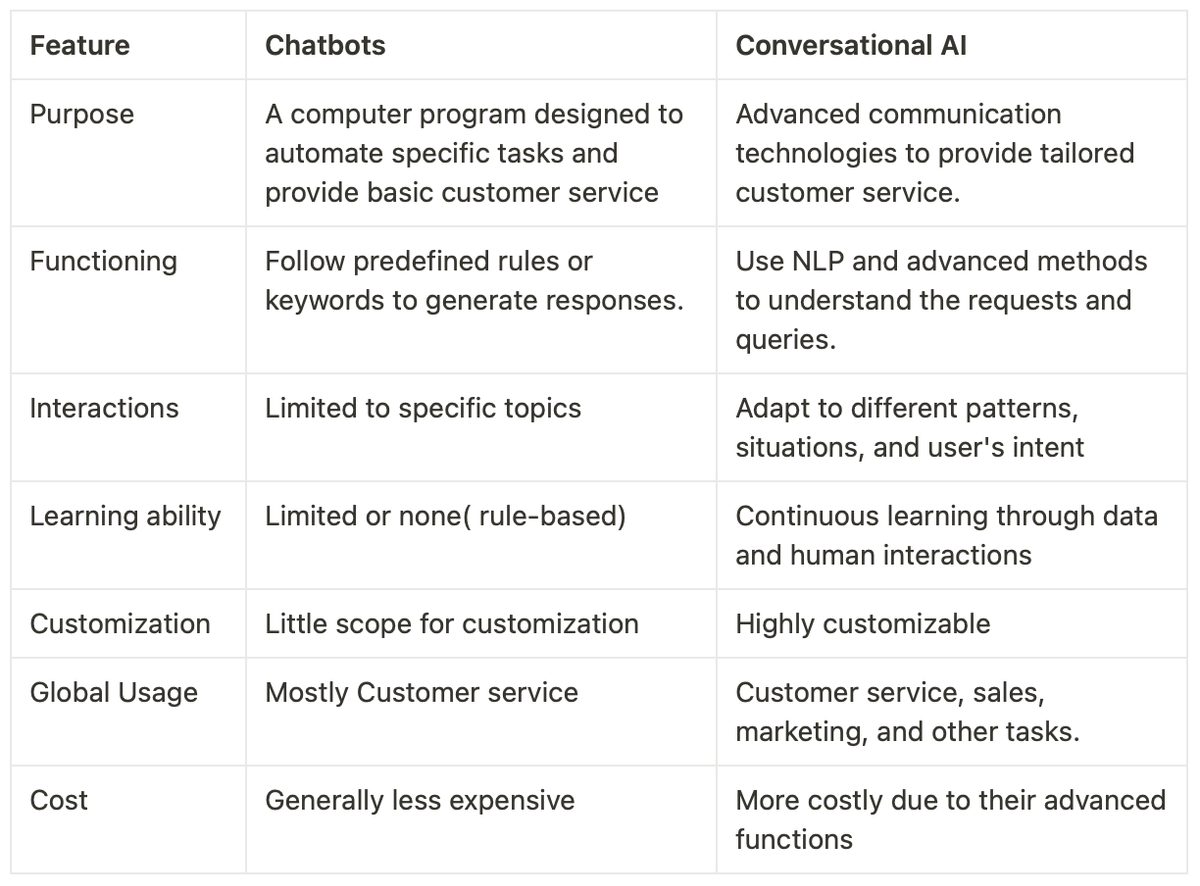Are you a business owner planning to automate your customer service? Read thi...

Businesses are realizing the importance of customer service, so they’re incorporating AI customer service more and more. Many organizations are moving towards service automation. Different AI software, such as chatbots or voicebots, are helping businesses provide proactive customer support 24/7. According to a survey by Forbes, 56 percent of global companies are using AI automation for their customer support and related services.
E-commerce business owners need to understand the difference between chatbots vs conversational AI before using them in customer support. These terms are often considered the same. However, there are many prominent differences between them.
Chatbots are computer programs that can chat or engage in conversations with humans and automate simple interactions like answering FAQs. On the other hand, conversational AI is a system of different programs and applications powered by AI, such as chatbots and virtual assistants.
Both chatbot and conversational AI are used in customer service, support, and other areas to meet specific business goals.
A chatbot is a computer program used in customer service to respond to customers' questions and queries. In short, chatbots operate straightforwardly: The user sends a message, and the chatbot processes it to generate an appropriate response. The basic chatbots are limited to specific tasks such as booking a flight, ordering food, or online shopping queries.
There are two main types of chatbots, i.e., rule-based chatbots and AI chatbots.
Rule-based chatbots are also known as decision-tree bots.These chatbots work according to a set of fixed rules and information. These rules are designed according to queries a chatbot is familiar with and generate answers for users.
Rule-based chatbots can use very basic or complicated rules. However, they can only answer queries within their defined rules. These chatbots don't learn from their interactions with humans and can only perform work under the scenarios they are trained for.
AI chatbots are advanced applications that can interact with users in a conversational way through their NLP training and machine learning.
AI chatbots are able to learn and interpret human responses continuously. This enables them to handle a more expansive range of conversations.
Unlike basic chatbots, AI chatbots can understand requests and information outside their internal data and respond to different situations accordingly. They are able to interpret a customer's intent and predict what they are exactly looking for on a website.
In short, basic chatbots follow a strict "If-then" approach, whereas AI chatbots use advanced features to create free-flowing natural responses.
Both rule-based and AI chatbots are extensively used in customer services to guide people, answer their queries, and promote a brand's products or services. According to a market analysis by Mordor Intelligence, the chatbot market size is expected to reach USD 7.01 billion in 2024.

Source: Mordor Intelligence
Conversation AI is an advanced communication technology that interacts with users in a more human way by engaging with them on a personal level.
The purpose of conversational AI is to create the experience of a contextually aware conversation through NLP and machine learning. Conversational AI is developed with the help of a knowledge base, an internal data library that is useful for customer support, answering FAQs, and generating appropriate responses.
These are advanced AI chatbots designed for text-based conversations and primarily used in customer services. These chatbots interact with customers through different messaging apps, answer their FAQs, guide them about a brand's products, send customized promotional content, and help them throughout their buying journey. In short, These chatbots play a massive part in effective customer service.
Also known as voice or AI assistants, these applications are optimized for voice-based interactions. Users can send voice-based requests and queries in a language they want without the hassle of typing. Virtual assistants provide a real-time immersive conversational experience, similar to speaking with another human. Some famous examples of virtual assistants are Siri, Alexa, and Google Assistant.
The most notable benefit of conversational AI apps is their ability to proceed and communicate in different languages according to the user's preferences. This is one of the most prominent differences of the whole chatbots vs conversational AI discussion.
The global conversational AI market is expected to reach $32.62 billion by 2030. This means after a few years, conversational AI will be leading the service automation industry.

Whether it is a rule-based chatbot or a conversational AI application, automated messaging technology is now an integral part of E-commerce customer service. Let us understand this with some examples from E-commerce businesses.
Urbanstems is an online forum specializing in selling flowers and exotic plants. Its website has a 24/7 live chat feature where a chatbot is omnipresent to facilitate customer service. Considering the urgent nature of the business, customers can quickly inquire about their order status, late delivery, and quality complaints through a chatbot. The chatbot also enables customers to share pictures of their order in case of a delivery complaint.
As a rule-based chatbot, this feature can only help with a fixed set of predefined questions. The good thing is it can quickly transfer you to a live agent in case you need detailed assistance.
H&M, a famous international clothing brand, made an AI chatbot on the messaging app Kik. It engages with users in a conversational style by asking questions to understand their clothing style and fashion preferences. As a digital stylist, H&M's chatbot can recommend different outfits to customers as per their requirements and also send personalized recommendations to save them from endless browsing.
Understanding the importance of polls and surveys in digital marketing, this chatbot allows users to select pre-existing outfits and vote on them.
Let's do a quick comparison of chatbots Vs conversational AI to see how they are related yet different from each other.

The comparison between chatbots and conversational AI shows various differences regarding basic features, working capacity, and ability to handle different tasks.
Conversational AI technologies need to include the contributions of basic chatbots in customer service. Think about a hybrid system that uses chatbot, conversational AI, NLP, and machine learning together. For example, chatbots verify a customer's identity to check if they are eligible for a particular service and then hand it over to conversational AI for complex queries.
This is just one practical example of how traditional chatbots can collaborate with conversational AI. More advanced integrations can definitely result in better customer service.
AI support and automation plays an essential role in customer service. The detailed comparison of chatbots vs conversational AI shows that both applications can be extensively utilized as a hybrid model to automate customer support, streamline business communication, marketing, and other fields. However, conversational AI definitely has an edge over basic chatbots due to its advanced communication skills.
Are you thinking about a similar customer service system for your business? Aidbase provides the AI support you didn't know you needed. With Aidbase's AI-powered chatbots, email automation, and ticketing support, create a holistic customer experience and always stand out from your competitors.